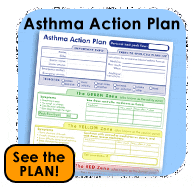What's an Asthma Action Plan?
Article Translations: (Spanish)
What's an Asthma Action Plan?
An asthma action plan is a set of instructions that you create with your doctor to help you control your asthma. Following the plan can help you prevent flare-ups and deal with them if they do happen.
Having a written, step-by-step plan means that you don't have to memorize everything your doctor tells you about managing asthma. You can keep a copy with you at all times or memorize key parts of it.
The plan can help you make sure your asthma doesn't get in the way of playing sports, working out, going to parties, or doing whatever you want to do. Make it work for you!
What's in the Asthma Action Plan?
Asthma varies from person to person, so there isn't a one-size-fits-all asthma action plan. But all action plans will say what to do if you have a flare-up. The plan also will explain what medicines you need to take and when, and when you need to call the doctor or go to the ER.
If you use a peak flow meter, the action plan's color system makes it easy to figure out which instructions apply to you. The "zone system" is based on the colors of a traffic light. They use symptoms (and peak flow readings) to help you decide what zone your asthma is in:
- The green zone, or safety zone, explains how to manage your asthma every day, when you're feeling good.
- The yellow zone, or caution zone, explains how to look for signs that your asthma is getting worse. It also says which medicines to use to bring your asthma back under control.
- The red zone, or danger zone, explains what to do when a flare-up is severe.
You'll want to put your "personal best" peak flow reading on the plan so you'll have something to compare the new numbers with.
Your action plan also may include a list of triggers and how to avoid them, and things to do before exercising, if that's a trigger for you.
Understanding Your Asthma Action Plan
For your asthma action plan to work, you have to follow it even when you feel OK. Review the plan with your doctor and make sure you understand it. Talk with your doctor if you have ideas for making the plan work better for you. For example, your doctor might change the time of day that you take your asthma medicine so it fits into your schedule.
Also tell your doctor if you don't seem to need your quick-relief medicine as much anymore. If your asthma is well controlled, your doctor might reduce the amount of long-term control medicine you're taking.
Note: All information is for educational purposes only. For specific medical advice, diagnoses, and treatment, consult your doctor.
© 1995-2024 KidsHealth ® All rights reserved. Images provided by iStock, Getty Images, Corbis, Veer, Science Photo Library, Science Source Images, Shutterstock, and Clipart.com


